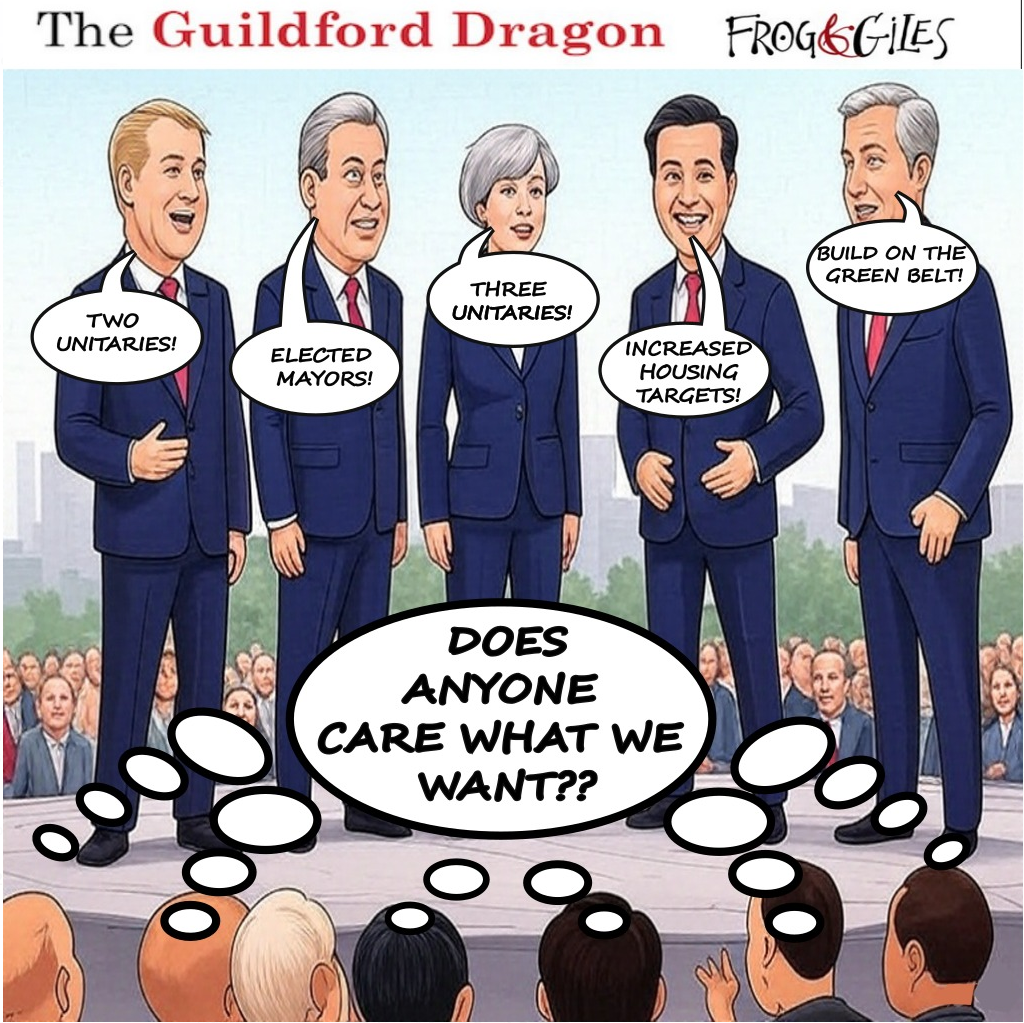 Abraham Lincoln
If given the truth, the people can be depended upon to meet any national crisis...
Abraham Lincoln
If given the truth, the people can be depended upon to meet any national crisis...
 Guildford news...
for Guildford people, brought to you by Guildford reporters - Guildford's own news service
Guildford news...
for Guildford people, brought to you by Guildford reporters - Guildford's own news service
Letter: Why Would Going Back to the People Be Undemocratic?
Published on: 13 Nov, 2019
Updated on: 13 Nov, 2019

Angela Richardson
From Michael Aaronson
In response to: Most Importantly For Me, Angela Richardson Supports Leave
Good luck to Angela Richardson and indeed to all the candidates for the Guildford constituency in the forthcoming General Election. But we can do without the nonsensical claim that MPs in the previous Parliament are to blame for the present Brexit impasse, and that their actions have been somehow undemocratic.
The fact is that when the UK voted in June 2016 to leave the EU most people had very little idea of what this would mean in practice.
We had conspicuously failed to have a proper debate about what kind of future relationship we wanted with the EU, and we were largely blind to the consequences of our leaving for the Good Friday Agreement and for peace and prosperity in Northern Ireland.
Only when the government under Theresa May set about trying to implement the result of the referendum did these difficulties became apparent.
Mrs May did manage to achieve a compromise of sorts, and it was always my view that the democratic thing to do next was to put this back to the people and seek ratification, only this time in a binding referendum.
In the absence of this, which would have delivered a definitive result, what were MPs supposed to do?
Should they just ignore the fact that much of what was in the Withdrawal Agreement had not been anticipated at the time of the referendum and was not what their constituents wanted? Or should they exercise their proper role of legislative scrutiny to try to make sure that what we achieved was the best possible outcome?
The idea that this was designed to produce an “answer expected by elites” is an insult to all MPs, who had to grapple with a really difficult problem. They weren’t “at odds with the public”; they simply reflected the fact that the public is still horribly divided over the Brexit issue.
This election provides an opportunity to find whether there is a majority for leaving the EU on the terms negotiated by the Johnson Government, in which case that will be the end of it.
But if not, surely the sensible thing to do will be to go back to the people and seek a clear answer to the simple question: do you want to leave on those terms or would you rather remain?
What could be more democratic than that?
Responses to Letter: Why Would Going Back to the People Be Undemocratic?
Leave a Comment Cancel reply
Please see our comments policy. All comments are moderated and may take time to appear. Full names, or at least initial and surname, must be given.Recent Articles
- Man and Woman Seriously Injured in Collision
- Updated: North Street Regeneration Moves One Step Closer
- Woking MP Calls for Former Borough Council CEO To Be Stripped of Honour
- Clarence Park: A New Chapter for Oxshott
- Letter: We Might Be Powerless But It Is Not ‘Nonsense’
- Notice: Dennisville Community Afternoon – May 18
- ‘Devolution’: ‘We Are Like Ants Considering How the Lawn Is Going To Be Cut’
- Guildford MP Attends Local Action Day Organised by ZERO Carbon Guildford
- New Outreach Service to Support Women Affected by Gambling
- Letter: I Suspect the Vast Majority Really Don’t Care About This Nonsense


Recent Comments
- Jules Cranwell on Letter: I Suspect the Vast Majority Really Don’t Care About This Nonsense
- John Ferns on Council Reorganisation: Proposals ‘Will Not Make a Jot of Difference’ Says Councillor
- Jim Allen on Council Reorganisation: Proposals ‘Will Not Make a Jot of Difference’ Says Councillor
- Roger Main on The Former Debenhams Building Is Going, Going… and in August Will Be Gone
- Nathan Cassidy on Guildford High Street, Then and Now – Nothing Can Stop Evolution
- Steve Grove on Letter: I Suspect the Vast Majority Really Don’t Care About This Nonsense
Search in Site
Media Gallery
Dragon Interview: Local Artist Leaves Her Mark At One of England’s Most Historic Buildings
January 21, 2023 / No Comment / Read MoreDragon Interview: Lib Dem Planning Chair: ‘Current Policy Doesn’t Work for Local People’
January 19, 2023 / No Comment / Read MoreA3 Tunnel in Guildford ‘Necessary’ for New Homes, Says Guildford’s MP
January 10, 2023 / No Comment / Read More‘Madness’ for London Road Scheme to Go Ahead Against ‘Huge Opposition’, Says SCC Leader
January 6, 2023 / No Comment / Read MoreCouncillor’s Son Starts Campaign for More Consultation on North Street Plan
December 30, 2022 / No Comment / Read MoreCounty Council Climbs Down Over London Road Works – Further ‘Engagement’ Period Announced
December 14, 2022 / No Comment / Read MoreDragon Interview: GBC Reaction to the Government’s Expected Decision to Relax Housing Targets
December 7, 2022 / No Comment / Read MoreHow Can Our Town Centre Businesses Recover? Watch the Shop Front Debate
May 18, 2020 / No Comment / Read More










Kevin Dewey
November 13, 2019 at 7:49 pm
So well argued by Michael Aaronson but what you are in essence saying is 52% of the electorate were ignorant and now will have a chance to be more sensible.
Rather arrogant I think?
Peter Gatford
November 14, 2019 at 3:18 pm
The cause of the current situation concerning leaving the EU lays squarely with the recently dissolved Parliament. Too many obtained their success in the last election by reneging on their undertaking to support their so-called, party mandates to support the result of the referendum and see through our departure from the European Union.
That is why, in my opinion, so many people are disenchanted with the apparently less than honest actions many of them have taken.
We have had the referendum, it became definitive when a new government was formed on the back of mandates supporting its result. I, unlike all too many others, am unable to speak about “facts” and “what people think and thought” that is all hearsay. We need to move on based on that referendum result, not on the best of three, five or seven.
If people do honestly want the best for this country, they should get behind a government which is trying to do what the majority asked it to do.
Colin Cross
November 15, 2019 at 9:45 am
Three years ago my neighbour caught me admiring his fancy new car and he made me an open offer to sell it to me “for a really good deal” in 2019 (he buys new every three years).
He called me recently and his idea of a really good deal was not my idea at all. The price he wanted turned out to be astronomical and he added a number of odd caveats about where I should park it and how often to valet it etc, things that I have never considered would be part of the deal.
Anyway, I decided that his deal was not for me and I told him so, trying to be as polite as possible. He grumbled but accepted my decision and we still talk to each other.
The moral of this story is that agreement in principle is not the same as signing off on a contractual legal obligation at a later date.
Mr Cameron, of all people, should have known that. No wonder he has gone into hiding for the last three years. His recent apologies fall on deaf ears in my house.
Colin Cross is a borough councillor but he wished it to be pointed out that this was written by him in a private capacity.
John Perkins
November 15, 2019 at 10:12 am
In the absence of a binding referendum MPs overwhelmingly voted Article 50 into law. All they had to do was obey it themselves.
Yet they weren’t alone in their intransigence. They were supported by unelected Lords and also by an unelected businesswoman aided by an unelected former PM who persuaded eleven unelected judges to strike down a decision made by the elected government.
Mrs May’s deal was rejected by MPs following their scrutiny of it. What possible reason is there to imagine the electorate would favour it?
The referendum was democratic and fair and the question was simple: Remain or Leave. Supplanting it by one which is effectively “Remain or Remain until a deal is agreed,” could never be. EU negotiators would only have to invent a new issue every so often for the UK to be kept eternally in the transition period with no democratic rights, only duties to pay and obey.
David Roberts
November 15, 2019 at 4:07 pm
After more than three years of mounting nastiness and muddle, absolutely no-one knows what the public now think about Brexit. So why not just ask them, as Mr Aaronson suggests?
Are Leavers secretly fearful their tiny 4% majority has evaporated? The understandable hesitations of the Parliament we elected in 2017 probably reflect a public swing against Brexit as understanding of its implications has grown. I’m sure December 12th will confirm this trend. We have already seen the big parties dump their pledges to cut immigration – an issue blown ridiculously out of proportion during the Mediterranean migrant crisis in 2015/16.
To argue, therefore, that the stale old referendum result of 2016 is set in concrete and should never, ever be revisited is like saying we should have Tony Blair back as Prime Minister because he won the general election in 2005. A democracy unable to renew itself periodically is not a democracy.